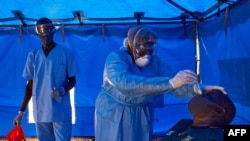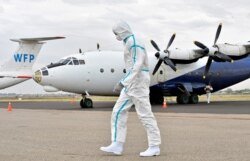Many Sudanese are taking the threat of coronavirus more seriously, as the number of confirmed cases has now topped 160, with 13 reported deaths as of Thursday.
Sudanese health officials say Khartoum has by far the most cases with 155. White Nile and Jazeera states each have three confirmed cases and River Nile state has one.
Residents who earlier did not believe there would be a COVID-19 outbreak in Sudan now say they’re following protective measures advised by the World Health Organization and the government.
Samia Argawi, a resident of Khartoum’s Jabra neighborhood, is one who changed her view.
“I make sure I wear gloves and mask and I have to keep a distance. And in most cases when the place is crowded, I... get back home without buying anything. We can still survive on Chapatti or anything else,” Argawi told VOA’s South Sudan in Focus.
Bella Ufendi Ndima, a South Sudanese national living in Khartoum’s Jebel Aulia neighborhood, said reports of new coronavirus cases are causing panic in her community.
Ufendi says she now practices social distancing and drinks herbal tea, believing it treats coughs and any other chest infections.
“Every two days, I do prepare hibiscus at home and all us at home drink it every morning and evening. We wash our hands with soap frequently and used sterilized [products] and overall, I do encourage everyone at home to continue praying so that we don’t get infected with corona,” Ndima told South Sudan in Focus.
Authorities in Khartoum have closed all mosques, churches and banned all forms of social gatherings for 21 days to stop the spread of COVID-19 in the country.
Elsewhere, calls for people to follow coronavirus safety guidelines are sinking in more slowly.
Abdurrahim Mohammed Hassan, a resident of Al Obeid town of Northern Kordofan state, said people are not following travel restrictions or the night-time curfew.
“We don’t see the implementation of curfew in the town, people move around all the time. I am speaking from my shop in the town market. People here don’t adhere to the curfew directives, and our people also don’t have enough awareness about the disease,” Hassan told South Sudan in Focus.
However, Mahmood Dagash says people are panicking about the rise in cases in the eastern state of Al Gadarif. There, health officials collected samples this week from 14 people suspected of having coronavirus. All 14 have been isolated and are awaiting test results.
“After we have these 14 suspected cases, you find that all the people talking just about these cases,” Dagash told South Sudan in Focus. He added that some are taking about closing nearby borders with Ethiopia and Eritrea.






